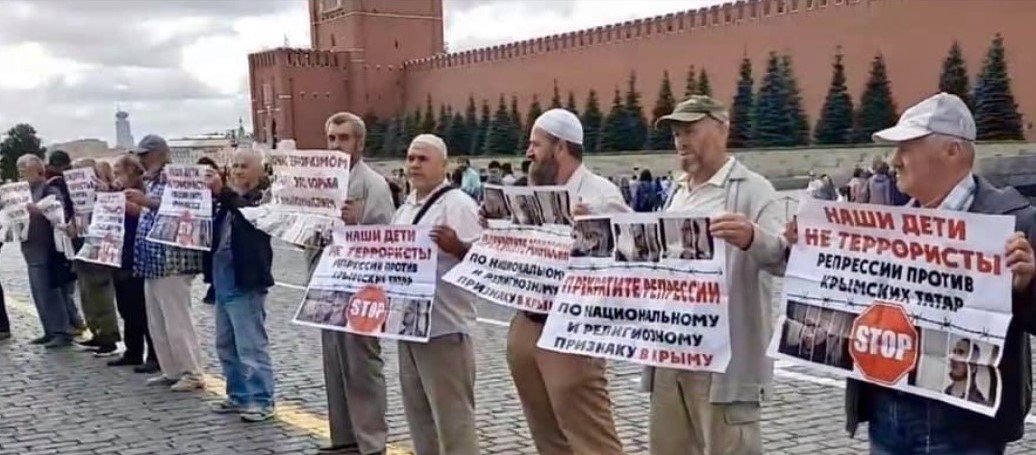Bitter déjà vu: Crimean Tatars arrested on Red Square for defending victims of repression

Seven Crimean Tatar, many of them veterans of the Crimean Tatar national movement, were detained in Moscow on 10 July while holding a totally peaceful picket calling for an end to ethnic and religious persecution in Russian-occupied Crimea. Around 20 activists, most in their fifties and sixties, gathered in a line along Red Square with placards reading: “Our children are not terrorists”; “The fight against terrorism in Crimea is a fight against dissidents” and “Stop persecution on ethnic and religious lines in Crimea”. The picket was in advance of the appeal hearing on 11 July against horrific sentences passed on four Crimean Tatars from Bakhchysarai on fabricated ‘terrorism’ charges.
According to Sinaver Nimmetulaev, one of the men detained, all seven are charged under Article 20.2 of Russia’s code of administrative offences with supposed ‘infringement of the established procedure for holding a meeting’. Since the ‘established procedure’, in breach of Russia’s Constitution, involves asking for permission, which will not be given, any peaceful protest can result in prosecution in Russia and occupied Crimea. Even Russian repressive legislation allows single-person pickets, but the enforcement bodies would almost certainly claim that the men were ‘too close’ for this to apply. All the men were, however, released after several hours on an undertaking that all would appear at the court hearing . All of the detained men are in their fifties and sixties, with the oldest, 69-year-old Reshat Emiruseinov, the father of one of the political prisoner. Rustem Emiruseinov was arrested on the same deeply flawed ‘terrorist’ charges on 14 February 2019. The other men are: Fevzi Abduramanov (54); Seiran Dzhemilev (56); Siar Gafarov (68); Eskender Lyumanov (54); Enver Seitumerov (68); and Sinaver Nimmetulaev (64).
The protest was especially poignant as it comes almost exactly 32 years since activists from the Crimean Tatar national movement held a large demonstration on Red Square demanding the right to return to their native Crimea after 43 years in enforced exile. That protest was vital in gaining international publicity for the plight of the Crimean Tatars in the Soviet Union.
Russia is once again occupying Crimea and members of the Crimean Tatar national movement have again come out in defence of new victims of political and religious persecution.
Most of the placards on 10 July held pictures of the four recognized political prisoners whose appeal is to be heard on Tuesday: Enver Mamutov; Rustem Abiltarov; Zevri Abseitov and Remzi Memetov.
The four Crimean Tatars have been in custody since 12 May 2016, with the charges essentially all about unproven ‘involvement’ in the peaceful pan-Islamist Hizb ut-Tahrir organization which is legal in Ukraine. Russia declared the organization ‘terrorist’ in 2003, almost certainly for political reasons and, since 2014, has been imposing monstrous sentences (up to life imprisonment) for such alleged ‘involvement’ in an organization which is not known to have committed any act of terrorism anywhere in the world.
These are widely acknowledged to be conveyor belt prosecutions in which one man, in this case, Mamutov, was designated the more serious charge of ‘organizing a Hizb ut-Tahrir’ group (under Article 205.5 § 1 of Russia’s criminal code), while the others were accused merely of involvement in that group (Article 205.5 § 2).
Long after the men’s arrest, new charges were brought against them, and others in analogous cases. The four Crimean Tatars from Bakhchysarai, all practising Muslims and fathers of at least two children, were supposed to having been planning to violently seize power (Article 278). In declaring all four men political prisoners, the Memorial Human Rights Centre pointed out that this new charge was “based solely on the fact that Hizb ut-Tahrir strategy envisages in some undefined future “the replacement of non-Islamic governments by Islamic”.
There was, in fact, no proof of involvement in Hizb ut-Tahrir, and much of the ‘evidence’ produced in court was of quite surreal irrelevance. These trials also use ‘secret witnesses’ whose identity and testimony cannot be verified in any way. In this case, for example, one of the alleged ‘witnesses’ claimed that he had been to see Zevri Abseitov at the latter’s dentist’s surgery, and that afterwards the two men had gone together to a café where Abseitov had told him that he was involved in Hizb ut-Tahrir. When questioned, the man gave a completely wrong description of Abseitov’s office. He was equally unable to describe the café that he claimed the men had visited together.
Russia’s use of ‘terrorism’ charges is profoundly cynical and brutally practical, since trial by jury is not permitted. All trials involving Ukrainian Muslims have taken place at the North Caucuses District Military Court in Rostov, with the most that judges are prepared to do in the face of such travesties of justice being to hand down slightly lower sentences than those demanded by the prosecutor in the case of men charged with ‘involvement’.
On 24 December 2018, three ‘judges’ - presiding judge Roman Konstaninovich Plisko, Anatoly Vladislavovich Kolesnik and Igor Vladimirovich Kostin essentially did as they were told and found all four men ‘guilty’ of the charges. Mamutov was sentenced to 17 years’ imprisonment; Abiltarov; Abseitov and Memetov were sentenced to 9 years. In all cases, the sentences were for the same maximum security prison colonies that other Ukrainian political prisoners, like Oleg Sentsov and Oleksandr Kolchenko are held in on equally fictitious ‘terrorism’ charges.





